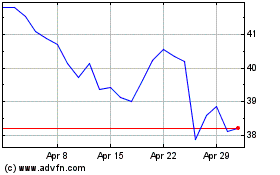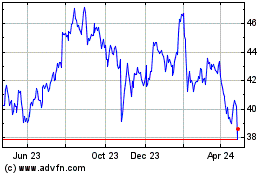By James R. Hagerty
Wendy Kopp was riding a train to New York one winter morning 17
years ago when a chatty older man sat next to her. She tried to cut
the conversation short and get back to work on her laptop. He
persisted. She finally told him all about the charity she founded,
Teach for America, which sends teachers to work in low-income
areas.
Her seatmate, H.F. "Gerry" Lenfest, ended up donating more than
$14 million to Teach for America.
Giving away money became Mr. Lenfest's mission after he sold the
cable-TV company Lenfest Communications in 2000. He and his wife,
Marguerite, preferred to give most of their wealth away in their
lifetimes rather than creating a perpetual foundation whose
trustees might stray from their vision. So far, their gifts total
more than $1.2 billion.
Mr. Lenfest, who died Aug. 5 at age 88, relied on his instincts
about people in making gifts. His wife was more deliberative. She
kept a note on the refrigerator reminding him to remember two words
when people asked for money: "no" and "why."
In 2014, Mr. Lenfest acquired the ailing publisher of the
Philadelphia Inquirer, Philadelphia Daily News and Philly.com for
about $88 million. Two years later he donated that company to a
nonprofit, now known as the Lenfest Institute for Journalism,
charged with preserving quality journalism in Philadelphia and
testing ideas that might sustain fact-based news reporting
elsewhere.
"I can't think of any cause that we support that's more
important than the support of the newspapers," Mr. Lenfest said in
2014. He avoided interfering in editorial policy, other than by
objecting when reporters described him as a billionaire. He
explained to one editor that his purchase of newspapers had
instantly deflated his net worth.
He rode city buses and flew coach. It wasn't only about being
frugal, said his son Brook. Mr. Lenfest found people in coach more
open to conversation.
Harold FitzGerald Lenfest, known as Gerry, was born along with a
twin sister May 29, 1930, in Jacksonville, Fla. His father, who
sold marine engines, moved the family to Scarsdale, N.Y., and Gerry
split his childhood between that posh suburb and a farm his father
bought in Hunterdon County, N.J. Showing an early flair for
business, he peddled eggs from the family farm to people in
Scarsdale and proved an ace marketer of Girl Scout cookies when
asked to assist his shy sister.
After his mother died when he was 13, he started skipping
school. His father sent him to Mercersburg Academy, a boarding
school he credited with shaping him up.
He studied economics at Washington and Lee University, where he
graduated in 1953, and served as an officer in the U.S. Navy. He
earned a degree at Columbia Law School in 1958. Before and during
his college years, he worked as a farm hand in Iowa, an oil-field
roughneck in North Dakota and a mate on an oil tanker.
After law school, he began a career at the law firm Davis Polk.
In 1965, he joined Triangle Publications, owned by Walter
Annenberg, as a staff lawyer. Triangle owned TV and radio stations,
the Philadelphia Inquirer and Daily News, and TV Guide and
Seventeen magazines.
Mr. Lenfest took charge of Seventeen in 1970. The magazine's
wholesome beauty tips had lost relevance in the hippie era, and
Seventeen delved into edgier topics, including abortion.
Cable TV was in its infancy and its prospects clouded, but Mr.
Lenfest was tempted when Mr. Annenberg decided to sell a tiny cable
business in Lebanon, Pa. "I always wanted to do my own thing and I
think I would have bought a Chinese laundry if it'd come up," he
said in an oral history. "I didn't know that much about cable...but
it was a new opportunity and new gamble that I wanted to take." He
bought the business for about $2.3 million in 1974 after a scramble
to line up partners and bank loans.
Initially, he ran the business from his home, with help from his
wife. It spread to include about 1.3 million customers in
Pennsylvania, New Jersey and Delaware before it was acquired by
Comcast Corp. in 2000 for about $5.6 billion.
Among institutions that received gifts from the Lenfests are
Columbia University, the Philadelphia Museum of Art, the Museum of
the American Revolution and the Curtis Institute of Music.
Mr. Lenfest invested in other businesses, including a
boat-repair yard in Bristol, R.I., and Jaguar dealerships near
Philadelphia. He enjoyed Saturday morning chats with salespeople
and mechanics at the car dealerships. "He remembered if one of them
had a son playing basketball, " said Lewis Klein, a former TV
executive who was a close friend.
While running the cable business, Mr. Lenfest one night began
chatting with a worker cleaning his office. The worker introduced
himself as Keith Leaphart and explained that he was running the
cleaning business while studying medicine. Mr. Lenfest, a white
suburbanite, and Dr. Leaphart, an African-American from inner-city
Philadelphia, bonded and became philanthropic partners.
Mr. Lenfest is survived by his wife, two sisters, a brother,
three children and four grandchildren.
After becoming billionaires, Mr. and Mrs. Lenfest continued
living most of the year in a three-bedroom house in Huntingdon
Valley, Pa., that they bought in 1966 for $35,000. At one point,
Mr. Lenfest later told the Inquirer, he had an architect design a
much grander home. A crew dug a hole for the basement. Then Mr.
Lenfest had second thoughts about the need for so much space. "You
know what?" he told the architect. "Fill up the hole."
Write to James R. Hagerty at bob.hagerty@wsj.com
(END) Dow Jones Newswires
August 10, 2018 10:44 ET (14:44 GMT)
Copyright (c) 2018 Dow Jones & Company, Inc.
Comcast (NASDAQ:CMCSA)
Historical Stock Chart
From Mar 2024 to Apr 2024

Comcast (NASDAQ:CMCSA)
Historical Stock Chart
From Apr 2023 to Apr 2024
